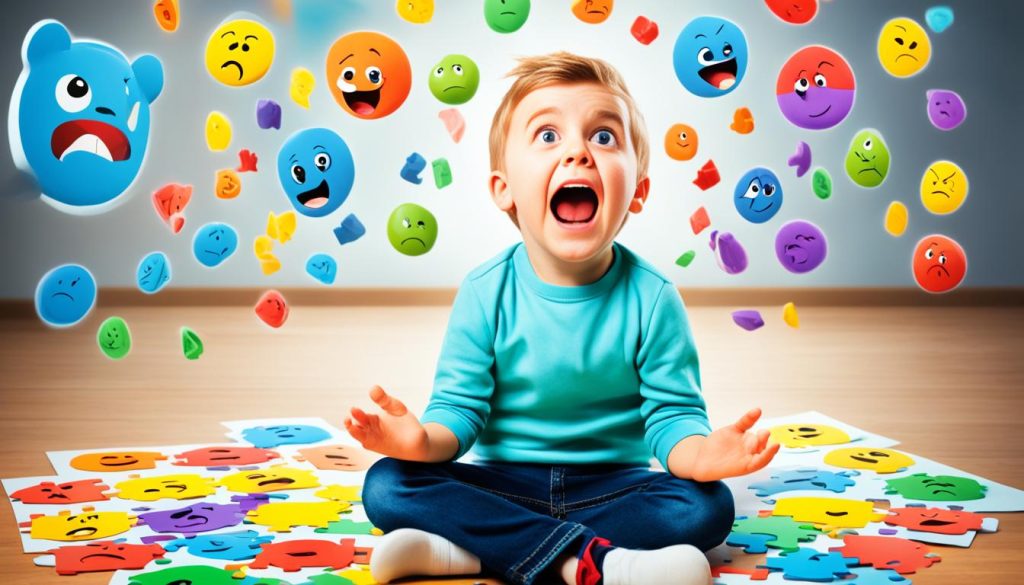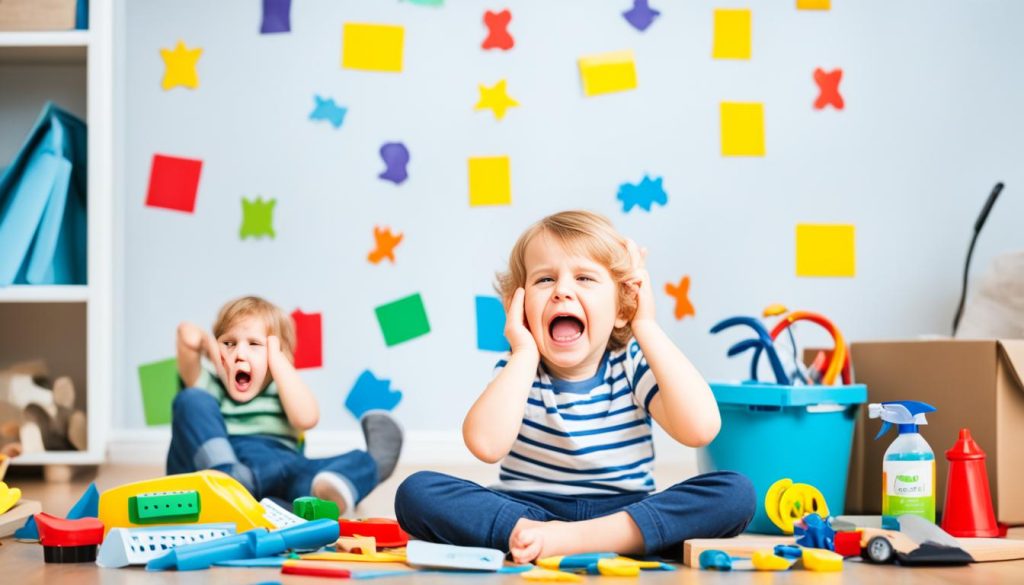Have you ever seen your child overwhelmed by strong feelings? Parenting is more than just watching your child grow physically. It’s about helping them through their emotions too. When your child cries from disappointment or clutches their fists in fear, that’s when Positive Parenting really shows its strength. Life is full of ups and downs, and you play a key role in supporting your child’s mental health.
By the time they’re one, kids already know you can help them with their feelings. This is called coregulation, where you help them manage their emotions. By understanding and accepting their feelings, you can turn tough moments into chances for growth and calmness.
Kids feel eight main emotions: anger, sadness, fear, joy, interest, surprise, disgust, and shame. Knowing these can help you use tough times to teach valuable lessons. By naming these feelings and showing them how to handle them, you create a safe space for your child to grow emotionally.
Key Takeaways
- Infants can respond to distress with self-soothing behaviors from as early as six months old.
- Providing frameworks helps toddlers manage their emotions independently.
- Naming emotions allows children to see them as normal and manageable.
- Children who feel safe improve their emotion regulation skills.
- Modeling coping strategies in calm moments can teach children effective ways to handle big emotions.
Understanding Big Emotions in Children
Kids feel strong feelings that can be hard for them and the adults around them. These feelings come from their brain not being fully developed yet. It’s important to understand these emotions to help your child.
What Are Big Emotions?
Big emotions in kids mean strong feelings like anger, sadness, or frustration. These feelings happen because kids are very sensitive and don’t know how to handle them well yet. They notice more things than adults do, which can make them feel more intense emotions.
Also, time moves slower for kids, so waiting can feel like forever. This can make them feel stressed and overwhelmed.

The Role of Emotional Intelligence in Children
Helping kids understand and manage their feelings is key to Emotional Intelligence. Parents need to guide them through this process. Encouraging creativity can be a good way for kids to express their feelings.
Parents also help kids deal with feelings from sibling rivalry. Experts like Dr. Siggie say it’s important to stay calm during these times. Rachel and Ashlee remind us that these big feelings will pass, showing us that they are temporary and can be handled.
The Role of Positive Parenting in Emotional Development
Positive Parenting is key to helping kids grow emotionally. It combines Managing Child Tantrums and Effective Discipline Strategies. This approach boosts kids’ emotional health and smarts. Knowing how to support your child’s growth is crucial.

Coregulation: Acting as the CEO for Your Child
Coregulation means parents help kids manage their feelings until they can do it on their own. It’s like a CEO running a company. This helps kids learn to handle their emotions better.
By being a steady presence, you help your kids through ups and downs. This teaches them important ways to cope with feelings.
- Provides a safety net during emotional upheavals
- Promotes self-regulation and self-discipline
- Facilitates development of emotional intelligence
Acknowledging and Validating Emotions
When you accept and value your child’s feelings, it lessens negative emotions. This is key to Managing Child Tantrums well. Kids feel secure and trusted when they know their feelings are heard.
- Improve parent-child relationships
- Encourage open communication
- Enhance emotional competence and mental health
Positive Parenting does more than just solve immediate problems. It prepares your child for a lifetime of emotional and social success. Using these methods leads to better thinking and social skills. This means a happier life for your child.
Parental Strategies for Managing Child Tantrums
Managing child tantrums is a big challenge for many parents. A structured approach with effective discipline strategies can turn these moments into valuable learning experiences. Here are some key strategies to consider:

It’s important to recognize when your child is getting upset before they throw a tantrum. Children around four years old often throw tantrums because they want to be independent but struggle with managing their feelings. Knowing what causes the tantrum, like being too tired or hungry, helps you deal with it better.
Listening and understanding your child’s feelings is key to calming them down. Giving them hugs and reassurance can really help. Then, you can redirect their attention to something else to stop the tantrum.
Stay calm when your child has a tantrum. This shows them how to stay calm too. Parents need to manage their own feelings well because kids pick up on ours. Being calm and confident helps your child feel safe and secure when they’re upset.
Choosing the right situation and distracting your child can help prevent tantrums. For example, making tasks easier for them can lower the chance of a tantrum. Giving them a safe space to express feelings helps them grow emotionally, without punishing them.
It’s also key to handle sibling rivalry and set clear rules during tantrums. Kids might feel upset when they share attention or adjust to a new sibling. A structured and understanding home can help them feel better.
Don’t give attention to tantrums by ignoring bad behavior and rewarding good behavior. Teach your child to negotiate calmly when they’re not upset. Using strategies like modeling negotiation and setting clear rules helps too.
| Tantrum Triggers | Parenting Strategies |
|---|---|
| Aversive tasks | Modify tasks to make them easier |
| Stopping fun activities | Anticipate triggers and use distraction |
| Hunger or over-stimulation | Ensure regular snacks and breaks |
Using strategies like Collaborative & Proactive Solutions can reduce tantrums by tackling the causes early. Encouraging your child to express feelings and modeling good behavior teaches them how to manage their emotions.
Teaching your child to calm down with techniques like slow breathing helps them manage their feelings better. The goal is to create a supportive environment that helps your child grow and makes parenting more rewarding.
Parent-Child Communication Techniques
Strengthening the bond between parents and kids is key for their emotional growth. Good communication makes the whole family stronger. It helps parents and kids connect better.

Empathy: The Heart of Understanding
Empathy is key in talking with your kids. It means understanding and sharing their feelings. This makes them feel heard and supported.
Kids who talk easily with their parents feel closer to them. Showing empathy shows you care about their feelings and thoughts. This can make the bond between you and your child stronger.
Encouraging Emotional Expression
It’s important to let your child share their feelings. Listen well, let them talk about their emotions, and answer them with care. This includes feelings like anger, sadness, and fear.
Sharing happy stories with your kids can make your talks better. About 75% of kids listen more to parents who talk positively. Lecturing doesn’t work as well.
Modeling Appropriate Behavior
Show your kids how to handle feelings well. Parents who talk well with their kids have kids who are more cooperative and secure.
By showing calm and respectful ways to express feelings, you set a good example. Listening well can make your bond with your child stronger. Just 10-15 minutes of talking each day can make your communication better, even when you’re busy.
Using these methods helps with parent-child communication. It also helps teach kids to be grateful and strengthens your bond.
Setting Boundaries with Kids
Setting boundaries with your kids is key to their independence, emotional health, and security. Clear expectations and rules help kids know what’s expected of them. This supports their brain development and emotional health.
Parents are crucial in setting boundaries by showing good behavior themselves. Healthy boundaries build a strong family where kids can grow well. Let’s look at how to set effective boundaries with kids:
- Teach Personal Space: Start by teaching kids about their personal space and respecting others.
- Screen Time Rules: In our digital world, setting rules for screen time is vital for a balanced life.
- Mealtime and Bedtime Guidelines: Rules for mealtimes and bedtimes help with better behavior and health.
- Positive Reinforcement: Rewarding kids positively encourages them to make good choices and respect the set boundaries.
Letting kids make choices within boundaries helps them feel in control and responsible. For instance, letting them pick their outfit within weather-appropriate limits is a way to encourage independence. Clear and confident communication helps your child see the value of these limits, set out of love and care.
Children might feel upset when you first set boundaries, seeing them as too strict. But it’s important to be clear, confident, and empathetic. Using visualization can also help kids understand and cooperate with the boundaries.
When setting boundaries, it’s important to explain the difference between needs and wants. Needs are basics like sleep, food, and safety. Wants are things like specific games or favorite foods. This helps kids understand why some limits are in place.
To keep boundaries effective and supportive, parents need to take care of themselves. Taking time for yourself helps you stay energetic in maintaining boundaries. Remember, a supportive family environment lets kids safely explore their feelings and learn right behaviors.
Building Self-Esteem in Children
Building self-esteem in children is key for their emotional growth. It means making a caring and supportive space for them. Here, they feel important and heard. Positive reinforcement parenting is a great way to do this, by focusing on the good things they do. Also, teaching them to be independent and responsible is crucial.
Positive Reinforcement Parenting
Positive reinforcement parenting is about praising kids for trying hard, not just for what they achieve. This makes them want to do more good things. By celebrating their strengths, kids start to see themselves as strong and able.
Studies show that positive feedback really helps kids feel better about themselves. They need to hear specific, true praise to link their actions to their wins. This kind of support lifts their confidence and helps them tackle challenges with courage. Plus, helping others and making good friends can greatly boost their self-esteem, giving them a strong sense of belonging.
Fostering Independence and Responsibility
Teaching kids to be responsible is important for their growth and self-esteem. Giving them tasks they can handle teaches them the value of helping out. This makes them feel important and valued, which is good for their self-esteem.
Letting kids make choices and learn from their mistakes builds their confidence. They learn they can handle both wins and losses. Encouraging them to set and reach for goals also makes them feel powerful and capable.
Showing kids that it’s okay to make mistakes and loving them no matter what boosts their self-esteem even more. This approach helps them see their worth, beyond their achievements or behavior.
The Importance of Consistent Routines and Setting Limits
Having consistent routines every day is key for healthy habits in kids. It makes kids feel safe and helps them manage their feelings. It also makes their world more structured.
Sticking to these routines helps lower behavior problems. Parents who set clear rules help kids know what’s right and wrong. This makes kids more likely to behave well and feel emotionally stable.
A good routine includes things like morning and bedtime routines, and daily tasks. These routines are important for the importance of sleep for kids. They also stop fights by making expectations clear.
Start with a few important rules and let your child help set consequences. This makes them more likely to follow the rules. Being consistent with praise and discipline helps kids behave better and be more cooperative.
| Benefit | Description |
|---|---|
| Sense of Security | Children feel safer and more secure knowing what to expect. |
| Emotional Regulation | Predictable routines help children manage emotions better. |
| Self-Discipline | Routines teach children self-control and responsibility. |
| Behavior Improvement | Clear limits reduce behavioral problems and foster cooperation. |
| Healthy Sleep Habits | Setting a consistent bedtime routine emphasizes the importance of sleep for kids. |
Being consistent with routines and limits is good for kids. Saying no to bad behavior sets clear limits. Predictable reactions teach kids to control their actions. Working together to set these rules helps kids develop healthy habits in kids.
Parenting and Raising Kids with a Growth Mindset
Parents aiming to build a growth mindset in kids should see challenges as chances for growth. It’s important to help them understand their feelings and handle them well. Teaching kids about their emotions is key to developing a growth mindset, helping them make sense of their experiences.
Teaching Kids to Identify and Manage Emotions
It’s vital for kids to know their feelings to improve their emotional smarts. By spotting what makes them feel certain ways, they can better manage those feelings. This skill is vital for a growth mindset, letting them see failures as chances to learn and grow.
Parents can lead by being open about their feelings. Talking about their own emotions helps kids feel seen and supported. Techniques like empathy and validation are also helpful. Plus, activities like Square Breathing can help kids stay calm in tough times, making it easier for them to keep learning.
Providing Emotional Outlets
Offering kids different ways to express and handle their feelings helps them deal with challenges better. Activities like art or sports not only let them out their feelings but also build resilience. Encouraging hobbies in kids lets them use their energy and emotions in positive ways.
These hobbies are great for lifelong learning. Through them, kids learn the importance of sticking with things and working hard. This helps them see that putting in effort and trying hard is what makes them grow and succeed.
| Growth Mindset | Fixed Mindset |
|---|---|
| Views intelligence as developing over time. | Sees intelligence as static and unchangeable. |
| Sees challenges as opportunities to learn. | Avoids challenges to prevent failure. |
| Emphasizes effort and persistence. | Praises innate ability. |
| Adopts adaptive strategies to overcome emotional obstacles in learning. | Struggles with emotional regulation and resilience in face of setbacks. |
Conclusion
It’s key to help kids handle big feelings for their growth. This article shared ways like emotional smarts, positive parenting, and good talking skills. These help kids deal with their feelings well.
In today’s world, balancing work and family is tough. But, having a steady routine and letting kids make choices helps them grow. Talking about hard topics clearly and with care makes kids feel heard and understood. This kind of support can really help prevent feelings of sadness and other emotional issues.
Parents play a huge part in teaching kids right from wrong. Studies show that kids’ traits come from genes and their environment. Positive parenting that fits your child’s nature helps them manage feelings better. This way, kids can make strong friendships and handle life’s ups and downs with ease.
FAQ
What are big emotions in children?
How can parents support their child’s emotional intelligence?
What is coregulation in positive parenting?
Why is it important to acknowledge and validate children’s emotions?
What strategies can parents use to manage child tantrums?
How can empathy enhance parent-child communication?
Why is setting boundaries with kids essential?
How does positive reinforcement parenting build self-esteem in children?
Why are consistent routines and setting limits important for children?
What does parenting with a growth mindset involve?
This post contains affiliate links. If you click on a link and make a purchase, I may earn a small commission — at no extra cost to you. Thank you for supporting this blog and helping me keep the patterns free! Read the full Affiliate Disclosure & Transparency.
